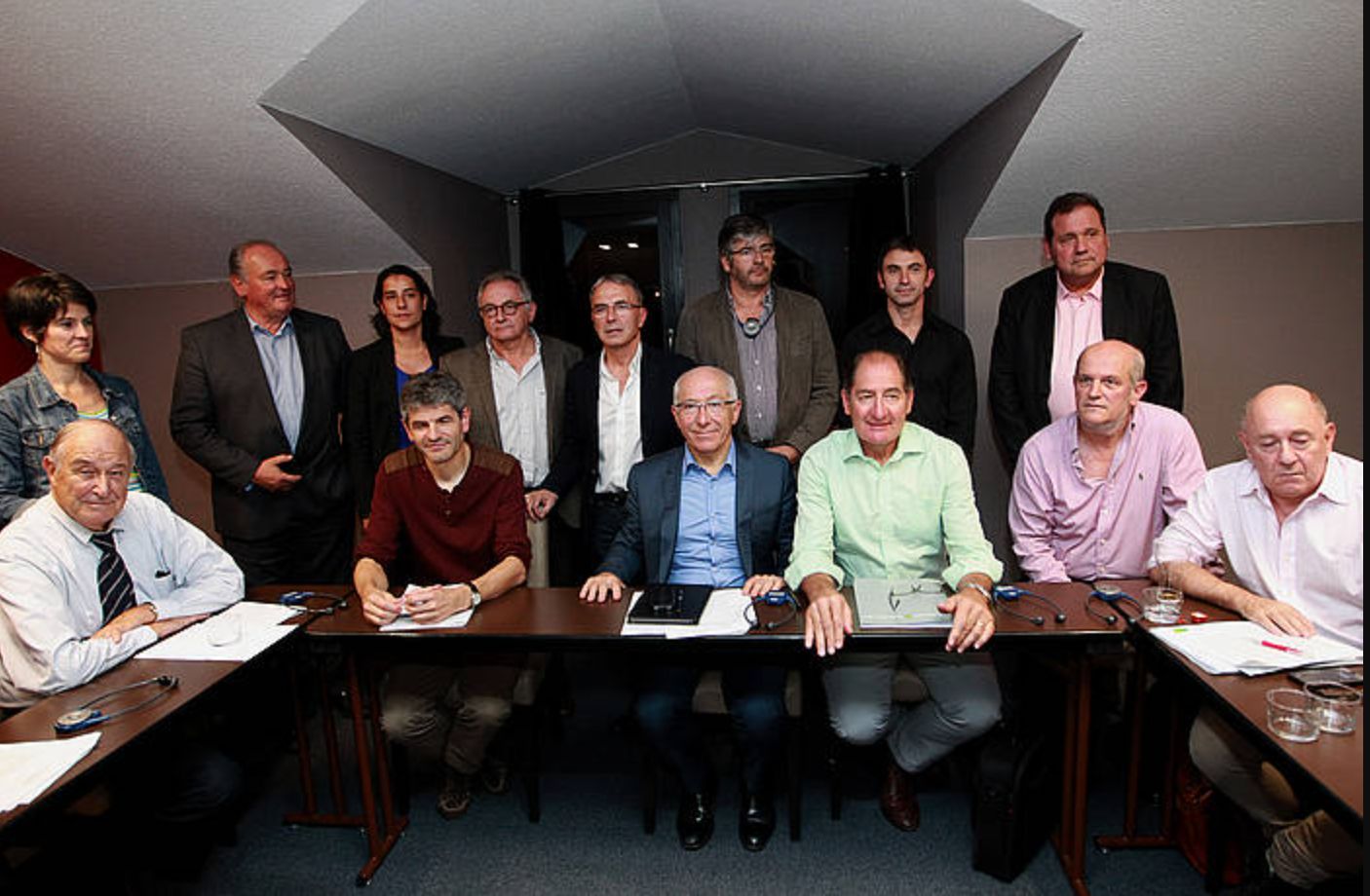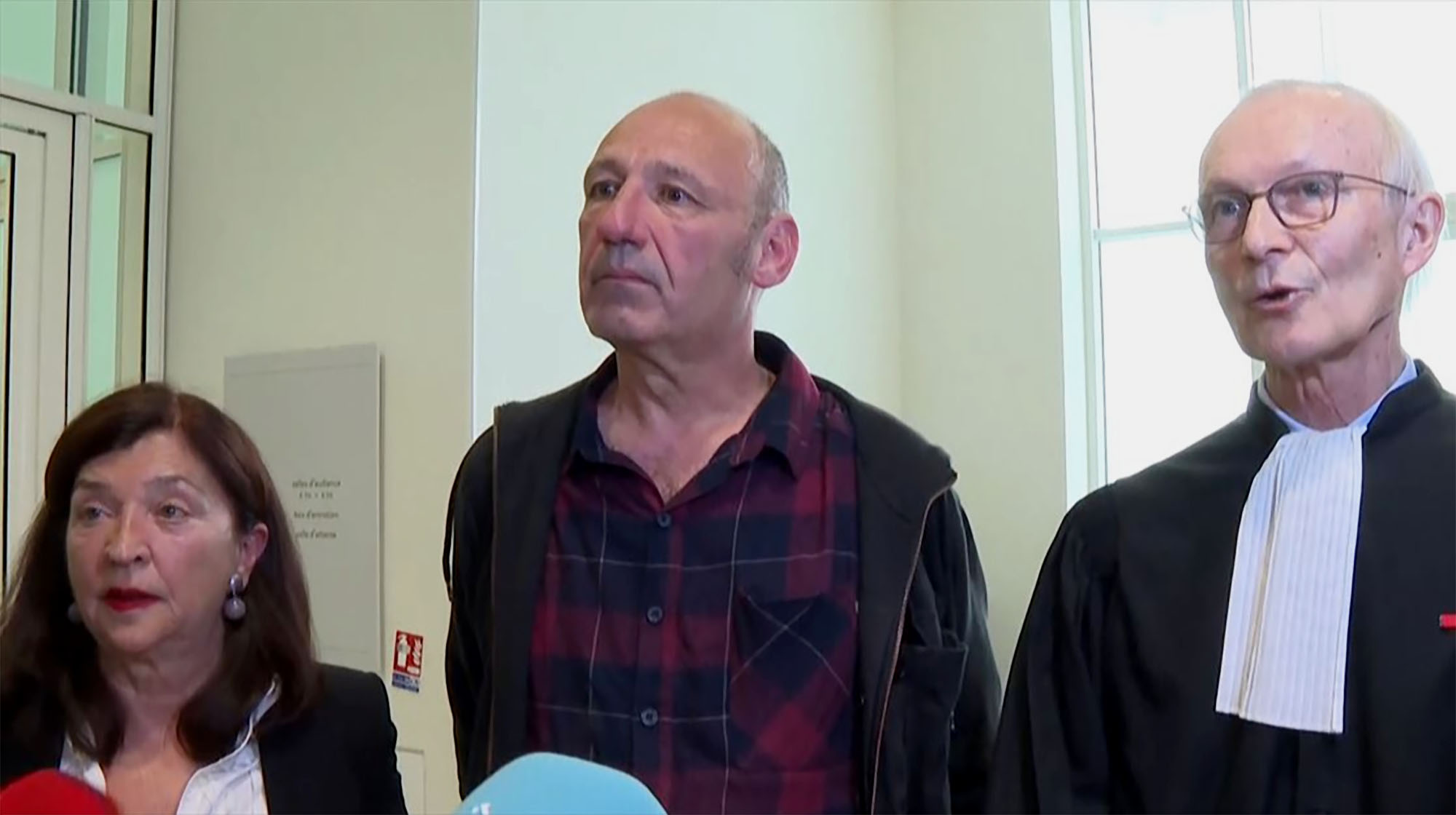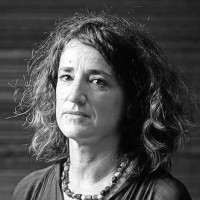"If you make a new story, society can get out of the pause it's experiencing."
- Vitoria, 1973. Studied Romanesque Philosophy. President of the Sortu and Parliamentarian of EH Bildu at the CAV. He currently serves as a professor at the Instituto Oriente de Vitoria-Gasteiz. Teaches literature to young people between the ages of 14 and 16. Only a gesture of love (Erein), author of the essay. The book proposes a new national story: “We have to recognize that we are on a pause, because it is the only starting point to get out of it,” he told us. We talked at the Artium Museum in Vitoria-Gasteiz.

“In the past, when we lived in a crude political conflict, we didn’t ask ourselves many questions,” you say. What question?
Being from Vitoria-Gasteiz, I cannot say the things that other members of the Abertzale left have said. For example, “my mother has been prey” or “I met my uncle in exile” or “I didn’t know him because he was killed.” Not me or my friends. We knew the time when there were two parts in the Basque Country: one part or another. And we were clear, those on one side were more oppressed than those on the other side, and we decided to choose for them. However, in this way, we did not ask several questions. For example, “Were we going to participate in the conflict or not?”
Who exactly were your supporters?
For all of them felt represented in the imaginary of the Basque left: Basques, women, workers, passions, young people, those who suffer the cruelties of the system the most. “We may not be right in everything, but right now there is no room to qualify,” we think. We were ideologically working on ourselves and we preferred to immerse ourselves in the conflict.
What empathy did you have with the victims of the conflict?
With us on one side, for example, we live in the Lasa and Zabala case. It was like us, young people, who had made him felt on our skin. They were young people who, like us, wanted to change this world and our empathy for them. I was at the Gaztetxe in Vitoria at the time, as well as uncompromising. He was a member of Hala Bedi radio and naturally friends began to participate in the neighborhood's HB. The scuffle occurred on the street, facing the front: Blue ribbons on one side and EH Go away on the other. We were very clear about what our difference was, among other things, because on the other side were the powerful.
For example: How did they internalize and “manage” the death of pp councilman Miguel Ángel Blanco by ETA?
Well, in my case, with a lot of contradictions. I was at the time in Jarrai-La Avance and a great friend and colleague of that time, “what has happened has shaken me inside,” I confessed. I was very sad because what I did was hard in itself, and because the reaction of the majority of our people, beyond mass media manipulation, made me doubt. But at the same time, the enemy, the State, dispelled or “clarified” all our doubts. The next day he hit us hard, conditioning our doubts and contradictions, and in practice he made him return to our previous position. Honestly, this is how I experienced the situation.
Has Basque society begun to understand the causes of what “happened, happened to us” today?
For a start, Basque society was very reassured by the end of ETA’s armed struggle, because people had not seen the use of violence for a long time. The majority observed that the conflict had put society in the spotlight. People have wanted to go through the page quickly and they understand what had happened more slowly.
What part should you internalize more? The Abertzale left? The other parties?
"When the armed conflict is over, we see ourselves in the mirror, and it doesn't seem like we are generally what we think, we're neither heroes nor antiheroes, we're more common."
There's bleeding. The truth is that I do not know whether we will be able to reach basic consensus. In the book I used the premise that the repression of Franco provoked ETA. ETA was the means for some citizens to respond to fascism. Subsequently, the first disagreement occurred in 1978, during the transitional period. For some, ETA had to end. For others, including myself, the Transition was a false closure of Franco, 40 years later, when ETA was over, many of those who then accepted the Transition say that Franco has continued to disguise, even those who said that ETA had to end in the Transition. In fact, the persecution of ETA is yet another consequence of the false closure of Franco. In these 40 years, the repression of the State, the Francoist power structures of the State, have remained in force until today. Those who said that ETA was going to end in the Transition now say that “accepting” this is contradictory. Of course ETA ended late? Also.
On one occasion, “in ETA discipline has been valued over creation,” said Gasteiztarra Emilio López Adan Beltza. As her self-criticism, she was criticized.
I also felt in that trance. I have said many times that in some situations the margin for nuances has been low. Sometimes, not specifying things accurately, or expressing them, placed you across the trench. At the same time, however, I do not know whether a conflict logic can make another situation possible. I do not think so. That is why I say that we have all been victims of the logic of the conflict. In various measures, of course, but the whole of society has been the victim of the logic of war.
It says that we need to make self-criticism. Is that too late? Is it being late?
The self-criticism I have made has been of myself, it cannot be otherwise. I said that I was late, that was the first thing. However, I have doubts about self-criticism. Because I do not know if the others, those on the other side, have ever thought about whether I have been late, or those on our side, it has not been because they remain silent in the face of the injustices committed against us, in the face of the rights that have violated us. As
the book says, “knowing the past is fundamental to know us and act constructively in the present: the myths must fall, both Sabino Arana and Txabi Etxebarrieta...
However, I accept both. Between the two, let us not forget the time of the lehendakari José Antonio Agirre. Lehendakari Agirre wanted to modernize the nationalism of Sabino Arana and adapt it to its time. Basque nationalism was in favour of liberal democracy, as did American and British democracy. But it was also a banal myth, which in a way had been disappointed by the Cold War. In these three historic moments, Euskal Herria lived intensely, sought his place in the world, achieving a way to tell his story.
You of your generation have suffered a great deal. You have received the dream, the disappointment and the tiredness of changing the world. But that hasn't just happened to that generation.
Well, times are becoming more and more complex, but generations are not separated from that, most things work together. However, I wanted to say that: In Euskal Herria in the 1990s, those of us who went to the public square met and inherited that conflict. However, we can now say that our generation has overcome this stage of conflict and that our responsibility to move on to another stage is ours. The present generation has not been immersed in this conflict, and we should give it a new space to release its creativity and energy, to build it freely.
You propose to a group of writers of your generation “to create works of fiction that take away the cultural paradigm from neoliberalism.” There's a kind of mission request there.
I would like to help bring about a kind of resurrection around Basque culture. I have dared to make proposals to promote debates. By that I mean that the world that postmodernism pointed out has changed, that postmodernism is no longer able to express the new world that is being created. I believe that in order to move forward as a country, a new cultural paradigm, from a Basque perspective, has to tell that new world, intervening before it.
“The only legitimate ethical attitude is anti-capitalist. We must act against the consequences of the acceleration of hyper caused by neoliberalism,” he wrote. You also say: “But without imposing anything on anyone.” The system's impositions are there. Seeing the past experience, your desire seems utopian. What is your teaching?
One of our mistakes or shortcomings, as a political movement, has been the way to confront the State – yet no one can deny the capacity that we have demonstrated for resistance – on that road we sometimes forget subjectivities. That is, that “we” was made up of a lot of “me” that were different. Many times we forget about the feelings and experiences that those “I” had in favor of this “we” general. I mean, we have to be careful about that “us.” It is important to form new “us”, build “plural communities” and if it is possible to be even stronger, as it is the only way to deal with capitalism, the current system, taking into account and respecting all “I”. What do the new generations
need to build their own ideology?
Well, contradictions, that things are not black or white, that there are a lot of nuances, that the truth is not complete, and that is the only truth that is made up of all truths. That is the exploitable legacy of postmodernism.
No one has criticized the book because it says that “it is impossible to know the whole truth.”
But we have to try to get closer to the truth, even if it is not entirely possible, so that we are as close as possible. But to look at the future differently than the past. That is, in the search for a dream that most citizens imagine and share, not a single dream, but a horizon of many dreams, so that we citizens can walk together there. In my mind, of course, this horizon has no place in the legal frameworks of Spain and France, it surpasses them, but that would be the result of a journey as a people. In this way, perhaps, by making a new story, we can go out and set in motion the current stop that this society is experiencing.
Postmodernism has been exhausted as a cultural paradigm. He says that “everyone is the only world.” Yes?
"It seems that those of us on the left, those of us who harshly criticized liberal democracy, now we have to save liberal democracy itself"
Unfortunately, that is one of the hardest consequences of the latest globalisation. It is true that there are many worlds in this one world. But they all want to come to this and they don't let them. Indeed, from a cultural point of view, postmodernism helped to advance neoliberalism, and the world that is now being built is even worse. The hyper-acceleration of neo-liberalism means that at this time we are witnessing an “insufficient democracy”. It is not enough for those in power. New tyrants have emerged that are prepared to overcome the limits of previous democracy in order to meet the hunger for power: hence the rise of neo-fascism and the ultra-right. It seems that those of us on the left, those of us who harshly criticised liberal democracy, now we have to save the liberal democracy itself.
Is the “national narrative” practicable among all the communities and individuals that make up society, when at least three are national intentions?
I think so. It may be possible in view of the fact that the other national sentiments must be respected. I believe in a nation that knows how to articulate and respect the other languages, cultures and national feelings that exist in Euskal Herria around the Basque axis.
But the Basque nation is a minority nation.
Yes, it has always been a minority, we know how minority nations feel, but I think we are able to convey that empathy to others. I only hope that, when we own ourselves, we will continue to bet on minority nations.
How can Basque identity be reconciled in a diverse community?
Sharing a dream, projecting us into the future.
What kind of sleep?
"I believe in a nation that knows how to articulate and respect the other languages, cultures and national feelings that exist in the Basque Country around the Basque axis"
We have to look at Basque society for that. We must stop deceiving ourselves by thinking that we are this or the other. When the armed conflict is over, we see ourselves in the mirror, and it doesn't seem that in general we are what we think, we are neither heroes nor antiheroes, we are more common. If we walk through the streets of Vitoria-Gasteiz, we can see what Basque society is like today. That’s why we need to think about what kind of “sleep” we can share.
Indeed, the imaginary of the Basque nation has really changed in Vitoria-Gasteiz over the last 50 years.
It is obvious. In my daughters' school, in the Old Town, in their room there are eighteen children. These include nine different nationalities. Tenth Basque nationality. They're learning Euskera, they all understand each other and talk and play together. Then, they live in Arabic, Spanish, Catalan or Basque.
But is Spanish nationalism assuming this situation? Are you willing to share your dream?
No. Spanish nationalism defends loneliness in all areas: the only language, the only culture, the only way of being. The nation that we should project the Basques should be quite the opposite. If we want to make our way, we must fight this loneliness, our nation must be polyhedral, of very varied differences, where both those from Africa, Asia or America, and the Spaniards or the French will live comfortably. What unites us all is to live in Euskera, because our project is inclusive, taking into account the diversity that exists in society. The basis is to want to continue to live together, I think that's what we want, and it's no small thing. In Spain, that does not happen.
























